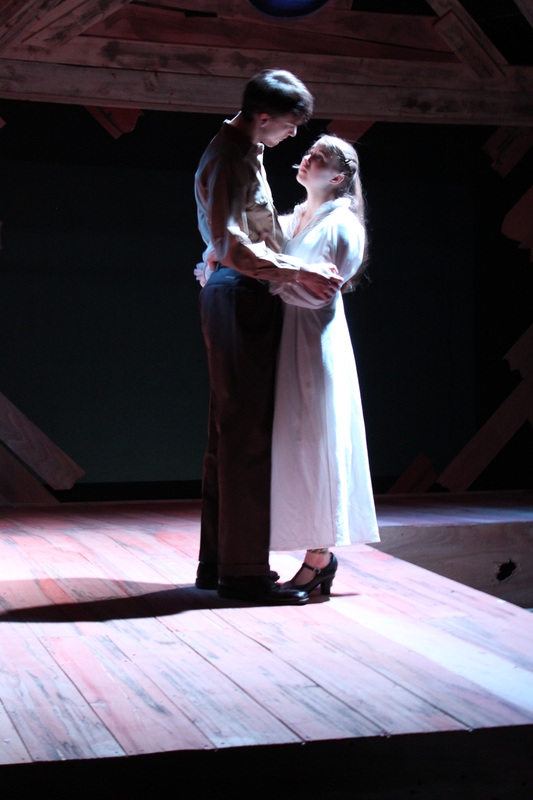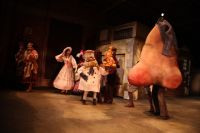|
Jacqueline Lawton: How long have you lived and worked as a playwright in DC? What brought you here? Why have you stayed?
Kitty Felde: I moved to DC from LA in March of 2009 and immediately set out to find Washington's theatre and playwriting community. Step one was becomming a Helen Hayes judge and seeing every theatre in town. Step two was finding a writing group. I came to DC to create the Washington bureau (me) for public radio station KPCC, Southern California Public Radio, based in Pasadena. I cover Capitol Hill for them. I stay because my day job work is still here and because my husband is a policy wonk with an expertise in nuclear disarmament and because DC is a great theatre town! JL: Have you ever been a member of a DC area playwrights writing group? If so, did you find it useful? Would you recommend that other playwrights join them? KF: I miss several things about LA: better summer weather, the beach, fresh produce in winter, and my playwrights lab at Ensemble Studio Theatre Los Angeles. Couldn't do much about the first three, but I was lucky to discover the Playwrights Gymnasium, headed by DW Gregory. It only meets monthly, but provides me with feedback, encouragement, criticism, and a community of writers. Not everyone needs this, but it's invaluable to me. I also have a weekly writing session with a playwright buddy I met at the Great Plains Theatre Conference several years ago, Omaha writer Ellen Struve. We meet on skype to share about 15 pages and kick each others' butts about submitting. JL: In DC, we have the Capital Fringe Festival, the Intersections Festival, the Source Theatre Festival, the Kennedy Center's Page-to-Stage Festival, the Black Theater Festival, and the Hip Hop Theatre Festival. We also have the Mead Lab at Flashpoint Theater Lab Program. Have you participated in any of these? If so, can you speak about your experience? KF: I've applied for both Source and Mead Lab and made the finals, but no go. However, last summer I plunged in and put up a show for Fringe - my one-woman show with a ghost ALICE, an evening with the tart-tongued daughter of Theodore Roosevelt. It was the perfect show for DC: hometown girl, political sniping, very funny. I hate producing. I co-founded Theatre of NOTE in LA and served as Managing Director for six years. I should have remembered that I hate producing. But I do know how to do it. And ALICE was quite the hit: we played to sold-out houses (there was even a fight in the lobby the last performance; I told a few folks they could stand in the back if they promised to help strike the set!) and the Washington Post made us a "critic's pick." We even made a bit of money. JL: What kind of work do you do to pay the bills? How do you balance this work with your writing? KF: My day job is as a public radio reporter, covering California issues and people, mostly on Capitol Hill. It's stressful, and because my station is three hours later, my days can stretch into the evening. Finding writing time has been a challenge. I should get up in the morning and write. But instead, I feel the need to read the paper, Politico, The Hill, tweets, blogs, etc. and my brain gets stuck in day job mode. When I'm cooking on a play, I'll write at dusk, sometimes in the windowed stairwell of my high rise, watching the sky turn dark. But it's tough. And this year's been tough. JL: How many plays have you had produced in the DC area? Were any of these plays self-produced? If so, where and what did you learn from that experience? KF: My only full DC production was ALICE. But I've had readings of other plays as well - THE LUCKIEST GIRL at MetroStage and Baltimore Playwrights Festival; TOP OF THE HOUR at Baltimore Playwrights Festival, A PATCH OF EARTH at Busboys and Poets as part of the Beltway Drama Series, and most recently, LAKE TITICACA as part of Theater J's 5 by 5 Festival. JL: If you could be produced at any theatre in DC, which would it be and why? KF: That's tough because I write different plays that would be appropriate for different theatres. I'd love to see my musical BUM'S RUSH at Signature, THE LUCKIEST GIRL at Imagination Stage, ALICE at Arena. A PATCH OF EARTH should be done at Theater J or Forum or Rorschach. GOGOL PROJECT belongs at Studio. And I'd like to write something on the burning of Washington for Active Cultures. JL: DC audiences are ... KF: Terrific! I love how there's age diversity here. I think the most senior of folks I've seen were at Quotidian, 20-somethings at Taffety Punk, and all mashed up together at Studio. Going to theatre is part of the culture of DC. And becomming subscribers! JL: DC actors, designers and directors are .. KF: First class. But it's a small town in some ways. You can count on seeing the same actors in several shows a season. Good for actors! But the pool seems small. Love the designers and directors! JL: DC critics are ... KF: Actually published in the newspaper! In LA, the theatre section had shrunk to half a page on Fridays with four paragraph reviews. So sad. Here, you can read a review or a feature story almost every day of the week. JL: How do you feel the DC theatre community has addressed the issues of race and gender parity ? How has this particular issue impacted you and your ability to get your work produced on the main stages? KF: Growing up, I was raised with the belief that women could do anything. My mom had been student body president, so I ran. And lost. It wasn't until years later that I realized Mom had gone to an all-girls college. In my co-ed school, girls were Vice President and Secretary, not President. It still comes as a shock to me that "girl" playwrights aren't produced on a par with their male counterparts in this 21st century. Several of my plays have multi-ethnic casts, which for some reason seems to confound theatres. At the same time, I think there's more of a geographic bias than gender or racial one. If I was an NYC playwright, a graduate of some hot playwriting MFA program, I think I'd have a better shot at a production at a big theatre here in DC. That said, it's a topic that DC theatres are talking about and that's encouraging. Consider the discussions at Theater J and the Roundhouse decision to add one play by a woman. The more attention is paid to the topic, the more the machine will be moved. JL: What advice do you have for an up and coming DC based playwright or a playwright who has just moved to D.C.? KF: See as much theatre as possible! Stay for talkbacks. Join the Dramatists Guild. Join the DC Area Playwrights group on Facebook. It's an easy town to meet people. And because it's a small theatre town, eventually you seem to run into the same people all the time. JL: What's next for you as a playwright? Where can we keep up with your work? KF: My GOGOL PROJECT returns to the stage in LA next year. And if a grant can be gotten, THE LUCKIEST GIRL will premiere at Ensemble Studio Theatre Los Angeles this winter. I'm currently at work on a second act to one of my favorite plays MAN WITH NO SHADOW - the story of a 1950's radio cowboy whose show is moving to television, but without him: he doesn't look like his voice. Act two is seven years later as the cast reunites to provide voices for cartoons. You can catch up with me at www.kittyfelde.com. I'm also a regular blogger at LA Female Playwrights Initiative and if you're a public radio junkie, you can hear me at www.kpcc.org.
0 Comments
Your comment will be posted after it is approved.
Leave a Reply. |
My BlogI'm a playwright, dramaturg, and teaching artist. It is here where you'll find my queries and musings on life, theater and the world. My posts advocate for diversity, inclusion, and equity in the American Theatre and updates on my own work. Please enjoy!
Categories
All
Archives
June 2020
Reading List
|



